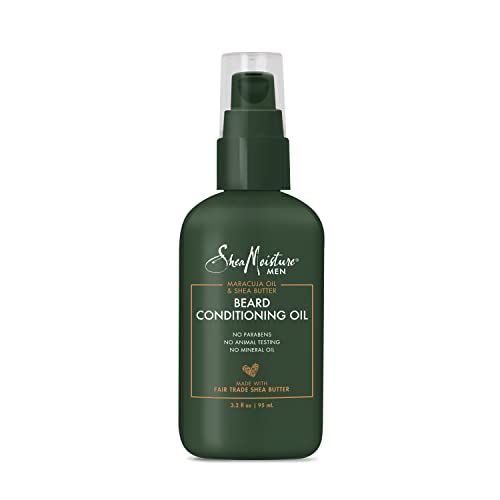
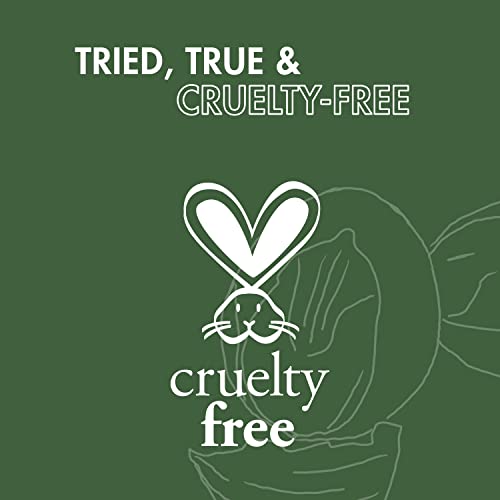
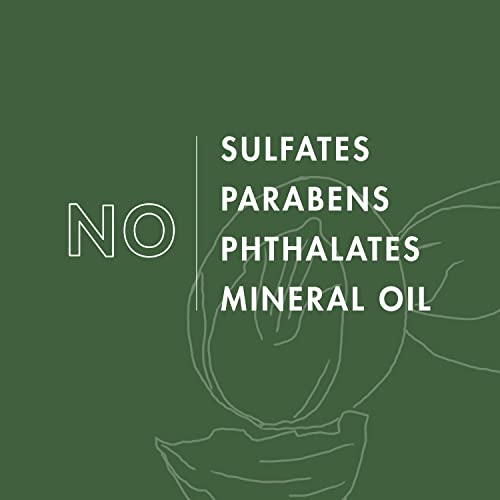
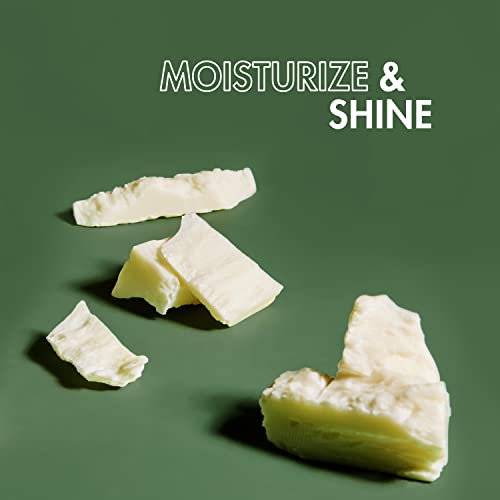
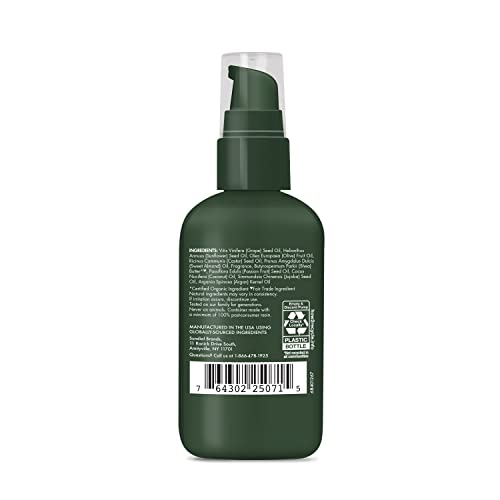
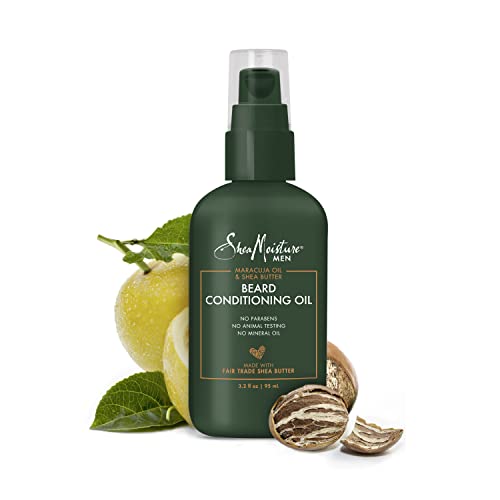
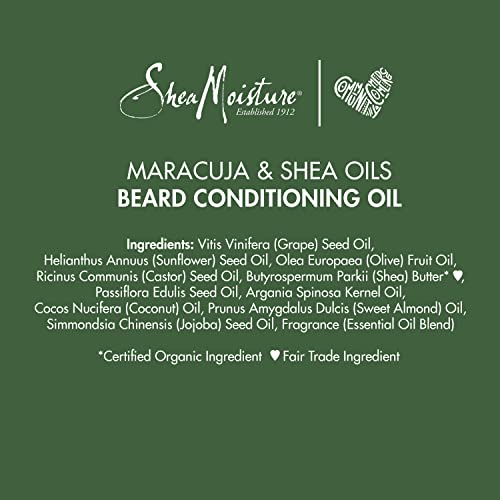
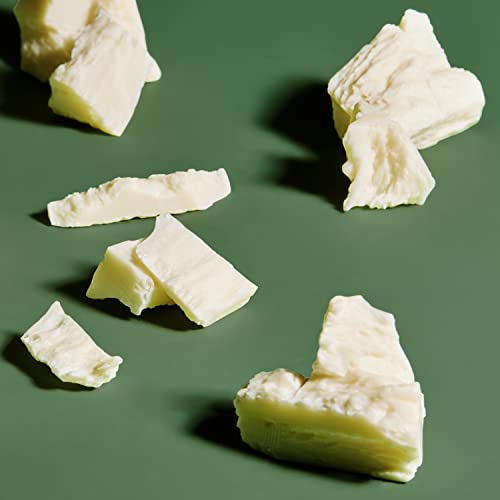


SheaMoisture Beard Conditioning Oil - Moisturizes & Softens with Maracuja Oil & Shea Butter - 3.2oz


Fragrance
High RiskFragrance refers to a mixture of aromatic compounds used in products to provide scent. It is commonly listed as 'fragrance' or 'parfum' on product labels and can serve various functions, including enhancing user experience and masking undesirable odors.
Sustai Insights
Fragrance offers functional benefits by improving product appeal; however, it poses significant health risks, notably a high likelihood of causing allergies and allergic contact dermatitis. Environmental risks include potential pollution and endocrine disruption, though its overall carcinogenicity is low. Regulatory bodies have noted concerns regarding its use, leading to a high-risk classification. Safe usage practices should be observed, and alternatives such as natural essential oils are recommended for those sensitive to synthetic fragrances.
Ricinus Communis (Castor) Seed Oil
Medium RiskCastor oil is extracted from the seeds of Ricinus communis and is commonly used in cosmetic and personal care products for its moisturizing and emollient properties. It is known for its ability to enhance skin absorption and provide a protective barrier.
Sustai Insights
Castor oil offers functional benefits as a moisturizer and emollient, enhancing skin absorption and providing a barrier against moisture loss. It is sustainably sourced and biodegradable. However, potential health risks include low levels of irritation and moderate concerns regarding developmental and reproductive toxicity. Environmental risks are low, with no significant pollutant or bioaccumulation concerns reported. Regulatory status shows no current restrictions. Overall, the risk level is assessed as medium, with recommendations for safe usage practices, and potential alternatives include other plant-based oils.
Prunus Amygdalus Dulcis (Sweet Almond) Oil
Low RiskPrunus amygdalus dulcis (sweet almond) oil is derived from the seeds of the almond tree. It is commonly used in cosmetic formulations for its moisturizing properties and as a carrier oil for other active ingredients. Its light texture allows for easy absorption into the skin.
Sustai Insights
Sweet almond oil provides functional benefits such as effective skin hydration and enhancement of skin absorption for other compounds. It is sustainably sourced and biodegradable. Health risks are low, with minimal concerns regarding carcinogenicity, allergies, and reproductive toxicity. Environmental risks are also low, with no significant pollutant or bioaccumulation potential. Regulatory bodies currently do not impose restrictions on its use. Overall, the risk assessment indicates a low risk level, making it a safe choice in cosmetic applications.
Passiflora Edulis (Passion Fruit) Seed Oil
Low RiskPassiflora edulis seed oil is a fixed oil extracted from the seeds of the passion fruit plant. It is primarily used in cosmetic formulations for its emollient properties, providing hydration and skin conditioning. Its light texture makes it suitable for various skincare products.
Sustai Insights
Passiflora edulis seed oil offers functional benefits such as skin hydration and emollience, and it is sustainably sourced with low environmental impact. Health risks are minimal, with low concerns for carcinogenicity, allergies, or reproductive toxicity. Regulatory status is favorable with no significant restrictions. Overall, the ingredient presents a low-risk assessment for health and environmental impact, making it a suitable choice in cosmetic formulations.
Argania Spinosa (Argan) Kernel Oil
Low RiskArgania spinosa (argan) kernel oil is a fixed oil extracted from the kernels of the argan tree, native to Morocco. It is commonly used in cosmetic formulations for its moisturizing properties, serving as an emollient and skin conditioner.
Sustai Insights
Argania spinosa kernel oil offers functional benefits such as effective hydration and nourishment for the skin and hair. It is sustainably sourced and biodegradable, contributing positively to environmental considerations. Health risks are low, with minimal concerns regarding carcinogenicity, allergies, or reproductive toxicity. There are no current regulatory restrictions on its use. Overall, it poses low risk, making it a suitable ingredient in cosmetic products. Safe usage practices should be maintained, and alternatives like jojoba oil may also be considered for similar benefits.
Vitis Vinifera (Grape) Seed Oil
Low RiskVitis vinifera (grape) seed oil is derived from the seeds of grapes, primarily used in cosmetics for its emollient properties. It acts as a moisturizer and is often included in formulations for skin care products due to its fatty acid composition and antioxidant potential.
Sustai Insights
Grape seed oil provides functional benefits as an effective moisturizer and antioxidant, contributing to skin hydration and protection. It is sustainably sourced and biodegradable. Health risks are low, with minimal concerns regarding carcinogenicity, allergies, or reproductive toxicity. Environmental impact is also low, with no significant pollutant potential. Regulatory bodies do not impose restrictions on its use. Overall, the ingredient poses a low risk, making it a safe choice in cosmetic formulations.
Olea Europaea (Olive) Oil
Low RiskOlea europaea (olive) oil is derived from the ripe fruit of the olive tree. It is commonly used in cosmetic formulations primarily as a moisturizer and emollient due to its nourishing properties for the skin. It also serves as a carrier oil for other ingredients in formulations.
Sustai Insights
Olea europaea (olive) oil offers numerous functional benefits, including effective moisturization and enhanced skin absorption properties, making it suitable for various cosmetic applications. It is a biodegradable ingredient, contributing to sustainability when sourced responsibly. Health risks are low, with minimal concerns regarding carcinogenicity, allergenic potential, and developmental toxicity. Environmental risks are also low, with no significant bioaccumulation or pollution potential noted. Regulatory bodies do not impose restrictions on its use. Overall, olive oil presents a low risk profile, making it a favorable choice in cosmetic products.
Cocos Nucifera (Coconut) Oil
Low RiskCocos Nucifera (Coconut) Oil is derived from the kernels of the coconut palm. It is primarily used in cosmetic formulations for its emollient and moisturizing properties, making it suitable for skin and hair care products.
Sustai Insights
Coconut oil serves as an effective moisturizer and emollient, promoting skin hydration and softness. It is sustainably sourced and biodegradable. Health risks are minimal, with low concerns regarding carcinogenicity, allergens, and reproductive toxicity. Environmental impact is also low, as it does not contribute significantly to pollution or bioaccumulation. Regulatory bodies have not issued restrictions on its use. Overall, coconut oil presents a low risk for health and environmental concerns, making it a safe ingredient in cosmetic products.
Butyrospermum Parkii (Shea) Butter
Low RiskButyrospermum parkii (shea) butter is a vegetable fat derived from the nuts of the shea tree. It is commonly used in cosmetic formulations for its emollient properties, providing moisture and improving skin texture. Additionally, shea butter is known for its ability to enhance the stability of products and deliver a creamy texture.
Sustai Insights
Shea butter offers functional benefits as an effective moisturizer, enhancing skin barrier function and texture. It is sustainably sourced and biodegradable, contributing to eco-friendliness. Health-wise, it is associated with low risks for carcinogenicity, allergies, and reproductive toxicity. Environmental impacts are minimal, with no significant pollutant potential identified. Regulatory assessments indicate no current restrictions. Overall, the ingredient presents a low risk, making it a favorable choice in cosmetic formulations.
Helianthus Annuus (Sunflower) Seed Oil
Low RiskHelianthus annuus (sunflower) seed oil is derived from the seeds of the sunflower plant. It serves primarily as an emollient and moisturizer in cosmetic formulations, helping to maintain skin hydration and improve texture.
Sustai Insights
Sunflower seed oil is effective as an emollient, providing moisture and improving skin texture while being biodegradable and sustainably sourced. It poses low health risks, including negligible concerns for carcinogenicity, allergies, or reproductive toxicity. Environmentally, it does not significantly contribute to pollution or bioaccumulation. Regulatory bodies currently do not list any advisories for this ingredient. Overall, it is assessed as low risk, with safe usage practices recommended. Alternatives include oils like jojoba or almond oil for those seeking different properties.
Simmondsia Chinensis (Jojoba) Seed Oil
Low RiskSimmondsia chinensis (jojoba) seed oil is extracted from the seeds of the jojoba plant. It is commonly used in cosmetics for its moisturizing properties and ability to mimic human sebum, making it beneficial for skin and hair care formulations.
Sustai Insights
Jojoba seed oil offers functional benefits such as effective moisturization and emollience, contributing to skin hydration and smoothness. It is sustainably sourced and biodegradable. Health risks are low, with minimal concerns regarding carcinogenicity, allergies, and reproductive toxicity. Environmental risks are also low, as it does not significantly contribute to pollution or bioaccumulation. Currently, there are no regulatory restrictions on its use. Overall, the risk level is low, and it is considered a safe ingredient with no significant adverse effects.
Prunus Amygdalus Dulcis (Sweet Almond) Oil
Low RiskPrunus amygdalus dulcis (sweet almond) oil is derived from the seeds of the almond tree. It is commonly used in cosmetic formulations for its moisturizing properties and as a carrier oil for other active ingredients. Its light texture allows for easy absorption into the skin.
Sustai Insights
Sweet almond oil provides functional benefits such as effective skin hydration and enhancement of skin absorption for other compounds. It is sustainably sourced and biodegradable. Health risks are low, with minimal concerns regarding carcinogenicity, allergies, and reproductive toxicity. Environmental risks are also low, with no significant pollutant or bioaccumulation potential. Regulatory bodies currently do not impose restrictions on its use. Overall, the risk assessment indicates a low risk level, making it a safe choice in cosmetic applications.
Passiflora Edulis (Passion Fruit) Seed Oil
Low RiskPassiflora edulis seed oil is a fixed oil extracted from the seeds of the passion fruit plant. It is primarily used in cosmetic formulations for its emollient properties, providing hydration and skin conditioning. Its light texture makes it suitable for various skincare products.
Sustai Insights
Passiflora edulis seed oil offers functional benefits such as skin hydration and emollience, and it is sustainably sourced with low environmental impact. Health risks are minimal, with low concerns for carcinogenicity, allergies, or reproductive toxicity. Regulatory status is favorable with no significant restrictions. Overall, the ingredient presents a low-risk assessment for health and environmental impact, making it a suitable choice in cosmetic formulations.
Ricinus Communis (Castor) Seed Oil
Medium RiskCastor oil is extracted from the seeds of Ricinus communis and is commonly used in cosmetic and personal care products for its moisturizing and emollient properties. It is known for its ability to enhance skin absorption and provide a protective barrier.
Sustai Insights
Castor oil offers functional benefits as a moisturizer and emollient, enhancing skin absorption and providing a barrier against moisture loss. It is sustainably sourced and biodegradable. However, potential health risks include low levels of irritation and moderate concerns regarding developmental and reproductive toxicity. Environmental risks are low, with no significant pollutant or bioaccumulation concerns reported. Regulatory status shows no current restrictions. Overall, the risk level is assessed as medium, with recommendations for safe usage practices, and potential alternatives include other plant-based oils.
Argania Spinosa (Argan) Kernel Oil
Low RiskArgania spinosa (argan) kernel oil is a fixed oil extracted from the kernels of the argan tree, native to Morocco. It is commonly used in cosmetic formulations for its moisturizing properties, serving as an emollient and skin conditioner.
Sustai Insights
Argania spinosa kernel oil offers functional benefits such as effective hydration and nourishment for the skin and hair. It is sustainably sourced and biodegradable, contributing positively to environmental considerations. Health risks are low, with minimal concerns regarding carcinogenicity, allergies, or reproductive toxicity. There are no current regulatory restrictions on its use. Overall, it poses low risk, making it a suitable ingredient in cosmetic products. Safe usage practices should be maintained, and alternatives like jojoba oil may also be considered for similar benefits.
Vitis Vinifera (Grape) Seed Oil
Low RiskVitis vinifera (grape) seed oil is derived from the seeds of grapes, primarily used in cosmetics for its emollient properties. It acts as a moisturizer and is often included in formulations for skin care products due to its fatty acid composition and antioxidant potential.
Sustai Insights
Grape seed oil provides functional benefits as an effective moisturizer and antioxidant, contributing to skin hydration and protection. It is sustainably sourced and biodegradable. Health risks are low, with minimal concerns regarding carcinogenicity, allergies, or reproductive toxicity. Environmental impact is also low, with no significant pollutant potential. Regulatory bodies do not impose restrictions on its use. Overall, the ingredient poses a low risk, making it a safe choice in cosmetic formulations.
Olea Europaea (Olive) Oil
Low RiskOlea europaea (olive) oil is derived from the ripe fruit of the olive tree. It is commonly used in cosmetic formulations primarily as a moisturizer and emollient due to its nourishing properties for the skin. It also serves as a carrier oil for other ingredients in formulations.
Sustai Insights
Olea europaea (olive) oil offers numerous functional benefits, including effective moisturization and enhanced skin absorption properties, making it suitable for various cosmetic applications. It is a biodegradable ingredient, contributing to sustainability when sourced responsibly. Health risks are low, with minimal concerns regarding carcinogenicity, allergenic potential, and developmental toxicity. Environmental risks are also low, with no significant bioaccumulation or pollution potential noted. Regulatory bodies do not impose restrictions on its use. Overall, olive oil presents a low risk profile, making it a favorable choice in cosmetic products.
Fragrance
High RiskFragrance refers to a mixture of aromatic compounds used in products to provide scent. It is commonly listed as 'fragrance' or 'parfum' on product labels and can serve various functions, including enhancing user experience and masking undesirable odors.
Sustai Insights
Fragrance offers functional benefits by improving product appeal; however, it poses significant health risks, notably a high likelihood of causing allergies and allergic contact dermatitis. Environmental risks include potential pollution and endocrine disruption, though its overall carcinogenicity is low. Regulatory bodies have noted concerns regarding its use, leading to a high-risk classification. Safe usage practices should be observed, and alternatives such as natural essential oils are recommended for those sensitive to synthetic fragrances.
Cocos Nucifera (Coconut) Oil
Low RiskCocos Nucifera (Coconut) Oil is derived from the kernels of the coconut palm. It is primarily used in cosmetic formulations for its emollient and moisturizing properties, making it suitable for skin and hair care products.
Sustai Insights
Coconut oil serves as an effective moisturizer and emollient, promoting skin hydration and softness. It is sustainably sourced and biodegradable. Health risks are minimal, with low concerns regarding carcinogenicity, allergens, and reproductive toxicity. Environmental impact is also low, as it does not contribute significantly to pollution or bioaccumulation. Regulatory bodies have not issued restrictions on its use. Overall, coconut oil presents a low risk for health and environmental concerns, making it a safe ingredient in cosmetic products.
Butyrospermum Parkii (Shea) Butter
Low RiskButyrospermum parkii (shea) butter is a vegetable fat derived from the nuts of the shea tree. It is commonly used in cosmetic formulations for its emollient properties, providing moisture and improving skin texture. Additionally, shea butter is known for its ability to enhance the stability of products and deliver a creamy texture.
Sustai Insights
Shea butter offers functional benefits as an effective moisturizer, enhancing skin barrier function and texture. It is sustainably sourced and biodegradable, contributing to eco-friendliness. Health-wise, it is associated with low risks for carcinogenicity, allergies, and reproductive toxicity. Environmental impacts are minimal, with no significant pollutant potential identified. Regulatory assessments indicate no current restrictions. Overall, the ingredient presents a low risk, making it a favorable choice in cosmetic formulations.
Helianthus Annuus (Sunflower) Seed Oil
Low RiskHelianthus annuus (sunflower) seed oil is derived from the seeds of the sunflower plant. It serves primarily as an emollient and moisturizer in cosmetic formulations, helping to maintain skin hydration and improve texture.
Sustai Insights
Sunflower seed oil is effective as an emollient, providing moisture and improving skin texture while being biodegradable and sustainably sourced. It poses low health risks, including negligible concerns for carcinogenicity, allergies, or reproductive toxicity. Environmentally, it does not significantly contribute to pollution or bioaccumulation. Regulatory bodies currently do not list any advisories for this ingredient. Overall, it is assessed as low risk, with safe usage practices recommended. Alternatives include oils like jojoba or almond oil for those seeking different properties.
Simmondsia Chinensis (Jojoba) Seed Oil
Low RiskSimmondsia chinensis (jojoba) seed oil is extracted from the seeds of the jojoba plant. It is commonly used in cosmetics for its moisturizing properties and ability to mimic human sebum, making it beneficial for skin and hair care formulations.
Sustai Insights
Jojoba seed oil offers functional benefits such as effective moisturization and emollience, contributing to skin hydration and smoothness. It is sustainably sourced and biodegradable. Health risks are low, with minimal concerns regarding carcinogenicity, allergies, and reproductive toxicity. Environmental risks are also low, as it does not significantly contribute to pollution or bioaccumulation. Currently, there are no regulatory restrictions on its use. Overall, the risk level is low, and it is considered a safe ingredient with no significant adverse effects.
Discover the SheaMoisture Beard Conditioning Oil, meticulously crafted to transform your beard care routine. Infused with nourishing Maracuja oil and Fair Trade shea butter, this conditioning oil not only moisturizes and softens but also leaves your beard looking, feeling, and smelling its best.
- Moisturization & Softness: Enriched with Maracuja oil and shea butter, this beard oil deeply hydrates and softens, promoting a healthy, well-groomed appearance.
- Natural Ingredients: Formulated without parabens, phthalates, mineral oil, or petrolatum, ensuring a clean and safe grooming experience for you and the environment.
- Fair Trade Commitment: Made with Fair Trade shea butter, supporting ethical sourcing and community empowerment.
- Easy Application: Simply apply a few drops to clean, dry beard and massage for optimal hydration, perfect for thick, coarse hair.
- Daily Use: Incorporate into your daily grooming routine for lasting softness and manageability, helping to keep your beard in check.
Elevate your grooming game with SheaMoisture, where quality meets sustainability.
Subscribe & Save with Sustai
- Best Price Guarantee: Always enjoy the lowest prices on sustainable home essentials.
- No Surprises: We’ll notify you before shipping. No hidden fees, ever.
- You’re in Charge: Change, pause, or cancel your subscription anytime with ease.
- Eco-Friendly Deliveries: Our grouped shipments mean less packaging and lower emissions.
Join us on a sustainable journey. Special offers for a limited time! Prices and promotions may change.
Recommended Products
Discover the SheaMoisture Beard Conditioning Oil, meticulously crafted to transform your beard care routine. Infused with nourishing Maracuja oil and Fair Trade shea butter, this conditioning oil not only moisturizes and softens but also leaves your beard looking, feeling, and smelling its best.
- Moisturization & Softness: Enriched with Maracuja oil and shea butter, this beard oil deeply hydrates and softens, promoting a healthy, well-groomed appearance.
- Natural Ingredients: Formulated without parabens, phthalates, mineral oil, or petrolatum, ensuring a clean and safe grooming experience for you and the environment.
- Fair Trade Commitment: Made with Fair Trade shea butter, supporting ethical sourcing and community empowerment.
- Easy Application: Simply apply a few drops to clean, dry beard and massage for optimal hydration, perfect for thick, coarse hair.
- Daily Use: Incorporate into your daily grooming routine for lasting softness and manageability, helping to keep your beard in check.
Elevate your grooming game with SheaMoisture, where quality meets sustainability.

You can have at most 2 Sustainable Steals products in your cart
Customer Reviews
Customers’ View
Customers appreciate the nourishing qualities and pleasant scent of SheaMoisture Beard Conditioning Oil. Many highlight that the blend of Maracuja oil and Fair Trade shea butter effectively moisturizes and softens beards, making them more manageable and easier to comb. One customer noted, "It leaves my hair feeling incredibly soft and manageable, with a healthy shine that lasts all day." The product is also praised for its clean ingredients, free from harmful additives, aligning with health-conscious values. However, some users reported issues with leakage during shipping, which detracted from their experience. Overall, this beard oil is valued for its functionality, pleasant fragrance, and eco-friendly ingredient sourcing, making it a solid choice for those seeking to maintain healthy facial hair.
AI-generated from the text of customer reviewsThis product is rated 4.5 of 5.0 stars.
It has received 51 reviews.




